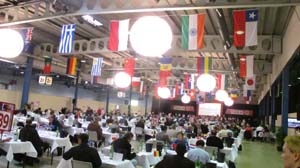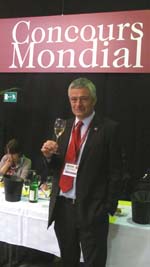 There is an increase of around 5% from the previous year when 6,964 wines were entered from 49 countries in Palermo, Sicily. France remains the leading participant with 2,405 entries (Bordeaux is the leading region followed by Languedoc-Roussillon). Spain with a marginal increased submission of 1,500 entries is followed by Italy with 759 and Portugal with 645 entries being next in line with Chile continuing to be the leading participant from the Southern Hemisphere. There is an increase of around 5% from the previous year when 6,964 wines were entered from 49 countries in Palermo, Sicily. France remains the leading participant with 2,405 entries (Bordeaux is the leading region followed by Languedoc-Roussillon). Spain with a marginal increased submission of 1,500 entries is followed by Italy with 759 and Portugal with 645 entries being next in line with Chile continuing to be the leading participant from the Southern Hemisphere.
The Concours Mondial de Bruxelles is perhaps the only competition which took it to different countries as the tasting venue, starting with Lisbon in Portugal in 2006, followed by Maastricht, Bordeaux, Valencia and Palermo in 2010 where Luxembourg was announced as this year’s choice. Change of venue makes each edition of Concours Mondial de Bruxelles a unique event.
So how difficult is it to change the venue every year with around 7,000 wines and what motivated them to change from organising it away from Belgium where it had been organised since 1994? ‘Not much of a problem, really,’ says Baudouin Havaux, Dirécteur Général who owns the competition founded by his father. ‘All it means is carrying truck loads of wine from Belgium to one of these European countries. Rest is all similar to organizing the tasting in our home country Belgium which was anyway getting to be a difficult city to organise due to hotel problem for the increasing number of international judges,’ he adds. About 300 tasters come from 40 nationalities for the 3-day session.
‘We believe this is quite a motivational move to attract the professional tasters who would get bored sooner or later doing the same tasting at one venue year after year. How else would you have come to Luxembourg otherwise, for instance?’ he commented. ‘Besides, it helps the host country showcase its wines as the Sicilian producers concurred last year at Palermo.’
Marc Kuhn from Luxembourg agrees. "Organising the 2011 Concours Mondial de Bruxelles in Luxembourg will undoubtedly enable us to showcase the breadth and depth of our range of wines.” While the quality of its wines has already got a seal of approval from most of the tasters who had an opportunity to taste a wide range of their white wines yesterday from Moselle, it is bound to get a much bigger exposure throughout the wine drinking world because of the journalists present here.
The wines entered have thrown some interesting statistics. For example, out of 973 Spanish red wines entered, 610 are predominantly or exclusively made from the Tempranillo variety. About 30% of Chilean red wines are Carmenere; for the first time, this flagship Chilean varietal has overtaken the traditional Cabernet-Sauvignon. For the first time France has entered predominantly Merlot, either as a single varietal or blended (720 wines out of a total 1,538 red wines entered compared with just 180 wines made primarily from Cabernet-Sauvignon or 110 from Syrah).
The wines entered also confirm the generally stated hypothesis that the alcohol levels have been universally going up, although the increase has not been as alarming at 13.28% in 2011 as one might have anticipated, as compared to 13.09% in 2006 and around 12.8% in 2000. This is interesting as the climate change is supposed to have changed the ripeness and sunshine hours gradually but steadily.
Since 2004, the organisers have also been working with a team of researchers from the Statistics Institute at the Catholic University of Louvain with the aim of making the results as fair, accurate and relevant as possible. Prof. Christian Ritter of the University said in a workshop yesterday that while statistics do not make good wine they definitely help make good wine. Talking of the statistical applications, he confirmed that his team does a complete profile analysis of all the tasters and the average of standardized marks are taken for calculating the medals by a jury commission.
Dispelling doubts that the extreme points are rejected (like in competitions like Vinitaly, for example), he affirmed that only if they are proved to be statistically out of range for a taster’s profile, are they eliminated and each taster is welcome and encouraged to express his personal view for every wine.
The competition, as Baudouin Havaux emphasizes is for the consumer and not the producer and the increasing number of producers taking part every year testifies to the fact that consumers are benefitted. ‘Carrefour is one supermarket chain in Belgium that lays great emphasis on this competition. Francis Lermihau, their wine buyer conducted a survey in which he kept the same wines with and without the medal labels in the stores. The sales of bottles displaying the medal were higher by 15%. I don’t know if the medal will have a value in India since the customer may not know the value of this competition but in every country the medal winning wines from a competition like Bruxelles have a distinct advantage.’ As Lermihau tells him, ‘there are three things I look at while buying wines- Price, quality and the medals won by the wine.’
 Another aspect of the competition which may find relevance in India is that after the competition, the organisers buy about 200 bottles of award winning wines from the market in different countries and compare them with the chemical analysis report of the sample submitted to ensure that the producer did not send a special sample for the Show. Apparently, there are producers in other countries who might be tempted as well. While this may dissuade some Indian producers from participating, there is a good case for the Indian Grape Processing Board to subsidise and send a group entry in the competition. Another aspect of the competition which may find relevance in India is that after the competition, the organisers buy about 200 bottles of award winning wines from the market in different countries and compare them with the chemical analysis report of the sample submitted to ensure that the producer did not send a special sample for the Show. Apparently, there are producers in other countries who might be tempted as well. While this may dissuade some Indian producers from participating, there is a good case for the Indian Grape Processing Board to subsidise and send a group entry in the competition.
The Indian flag at the competition is being kept flying high for the third time with Subhash Arora having attended the previous two tastings at Valencia and Palermo also, while Sourish Bhattacharyya, the Executive Editor of mail Today is a rookie at Luxembourg this year.
For those interested in results, they will be announced on Monday, May 6 and will be on their website.
Subhash Arora
Luxembourg, May 6, 2011 |